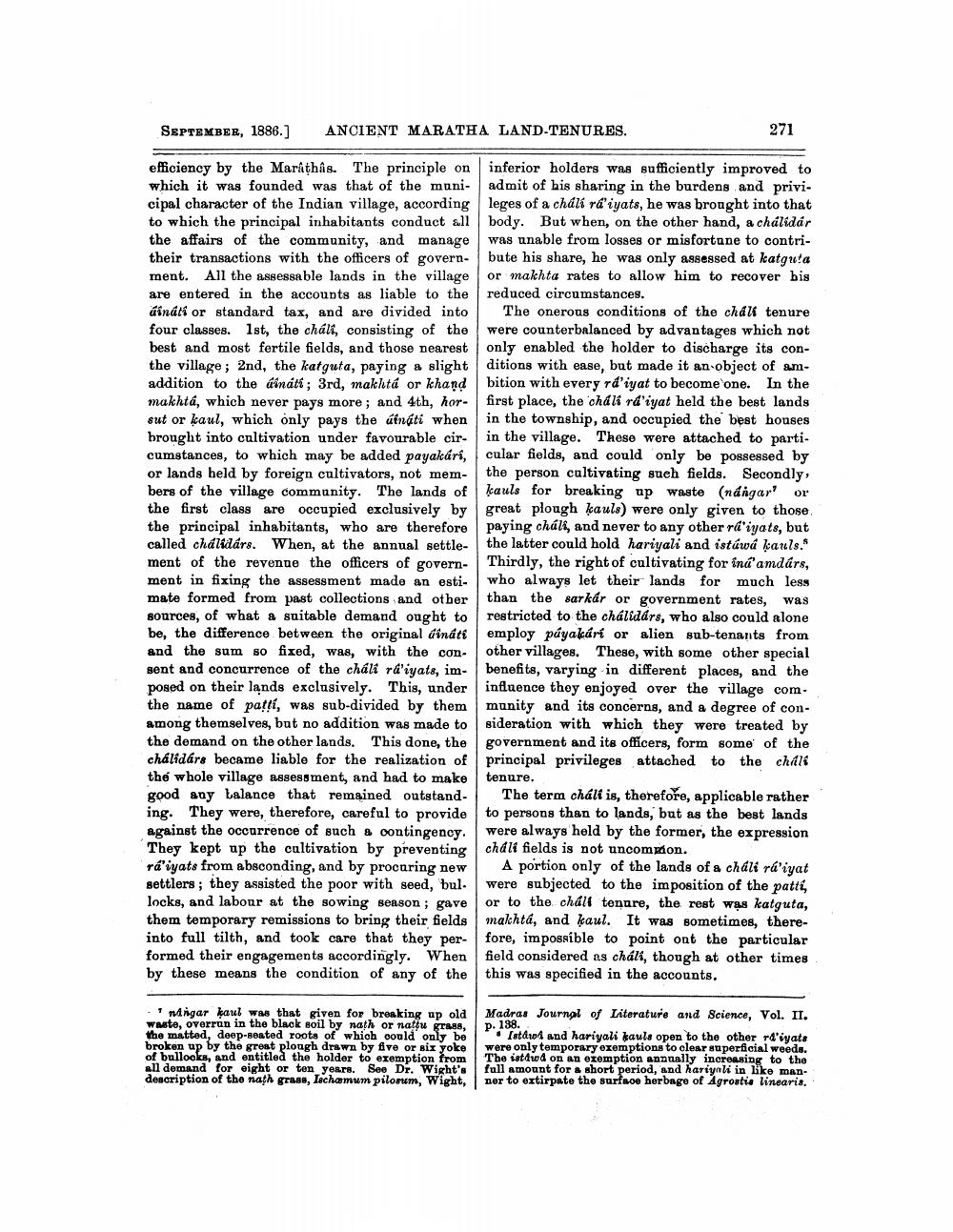________________
SEPTEMBER, 1886.)
ANCIENT MARATHA LAND-TENURES.
271
efficiency by the Marathas. The principle on inferior holders was sufficiently improved to which it was founded was that of the muni- admit of his sharing in the burdens and privicipal character of the Indian village, according leges of a chali ra'iyats, he was brought into that to which the principal inhabitants conduct all body. But when, on the other hand, a chálidár the affairs of the community, and manage was unable from losses or misfortune to contritheir transactions with the officers of govern- bute his share, he was only assessed at keatgua ment. All the assessable lands in the village or makhta rates to allow him to recover bis are entered in the accounts as liable to the reduced circumstances. úinak or standard tax, and are divided into The onerous conditions of the chali tenure four classes. 1st, the chal, consisting of the were counterbalanced by advantages which not best and most fertile fields, and those nearest only enabled the holder to discharge its conthe village; 2nd, the katguta, paying a slight ditions with ease, but made it an object of amaddition to the áinati ; 3rd, makhtá or khand bition with every rd'iyat to become one. In the makhta, which never pays more; and 4th, hor- first place, the chali rd'iyat held the best lands sut or kaul, which only pays the úinati when in the township, and occupied the best houses brought into cultivation under favourable cir- in the village. These were attached to particumstances, to which may be added payakára, cular fields, and could only be possessed by or lands held by foreign cultivators, not mem- the person cultivating such fields. Secondly, bers of the village community. The lands of kauls for breaking up waste (nángar? or the first class are occupied exclusively by great plough kauls) were only given to those the principal inhabitants, who are therefore paying cháli, and never to any other ri'iyats, but called chálidárs. When, at the annual settle- the latter could hold hariyali and istúwá kauls. ment of the revenue the officers of govern- Thirdly, the right of cultivating for iná amdars, ment in fixing the assessment made an esti- who always let their lands for much less mate formed from past collections and other than the sarkár or government rates, was sources, of what a suitable demand ought to restricted to the chálidárs, who also could alone be, the difference between the original dináti employ páyakárt or alien sub-tenants from and the sum so fixed, was, with the con other villages. These, with some other special sent and concurrence of the cháli ra'iyats, im- benefits, varying in different places, and the posed on their lands exclusively. This, under influence thoy enjoyed over the village com. the name of patti, was sub-divided by them munity and its concerns, and a degree of conamong themselves, but no addition was made to sideration with which they were treated by the demand on the other lands. This done, the government and its officers, form some of the chálidárs became liable for the realization of principal privileges attached to the chart the whole village assessment, and had to make tenure. good any balance that remained outstand. The term chálf is, therefore, applicable rather ing. They were, therefore, careful to provide to persons than to lands, but as the best lands against the occurrence of such a contingency were always held by the former, the expression They kept up the cultivation by preventing chali fields is not uncommon. rá'iyats from absconding, and by procuring new A portion only of the lands of a chali rá'iyat settlers; they assisted the poor with seed, bul. were subjected to the imposition of the patti, locks, and labour at the sowing season; gave or to the chali tenure, the rest was katguta, them temporary remissions to bring their fields makhta, and kaul. It was sometimes, thereinto full tilth, and took care that they per- fore, impossible to point ont the particular formed their engagements accordingly. When field considered as cháli, though at other times by these means the condition of any of the this was specified in the accounts.
- ningar kaul was that given for breaking up old waste, overrun in the black soil by nath or nattu grass, the matted, deep-seated roots of which could only be broken up by the great plough drawn by five or six yoke of bullooks, and entitled the holder to exemption from all demand for eight or ten years. See Dr. Wight's description of the nath grase, Iachamum pilomum, Wight,
Madras Journal of Literature and Science, Vol. II. P. 138.
[staro1 and hariyali kauls open to the other ra'iyats were only temporary exemptions to clear superficial weeds. The istud on an exemption annually increasing to the full amount for a short period, and hariyali in like man. ner to extirpate the surfaoe herbage of Agroatia linearis.




